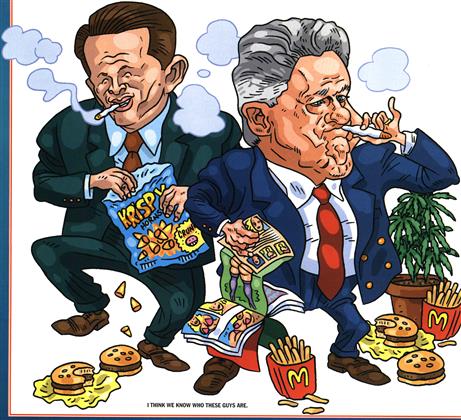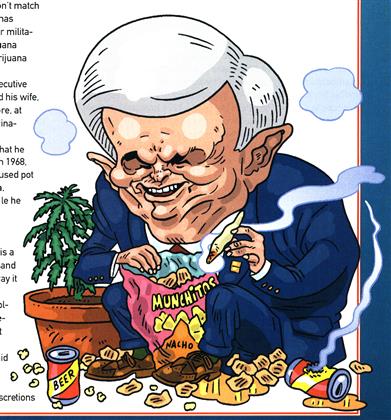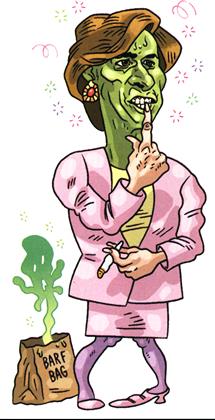Original publication: November 1998.
Thank you for reading this post, don't forget to subscribe!DID YOU INHALE?
That’s the question politicians have been asked before and after President Clinton’s infamous gaffe during his 1992 election campaign. Which of our representatives have admitted to smoking pot at some time in their life? You may be surprised to find out.
Politicians and pot. Putting the two together seems like an insult to pot. If it weren’t for politicians, pot would be legal. It’s almost impossible to find a mainstream politician who will even discuss marijuana decriminalization. But lurking in the closets of many of those self-righteous politicians are some pretty stinky, resin-stained skeletons.
The highest office in the land contains a guy who claims he’s never gotten high. President Bill Clinton was a relatively young man when he was elected president in 1992, a Vietnam War protester, a supposed liberal. Inevitably, during the 1992 campaign the Arkansas contender was asked if he’d used marijuana during his years at Oxford in England as a visiting student and antiwar protester.


“I experimented with marijuana a time or two.” Clinton told an interviewer, “and I didn’t like it, and didn’t inhale, and never tried it again.” He’s asthmatic, it was explained.
During an interview on an MTV program, Clinton was asked, “If you could try marijuana again for the first time, would you inhale?”
“Sure,” the asthmatic Clinton replied, “if I could. I tried before.” Clinton’s contradictory and cavalier responses certainly don’t match his Administration’s official policies regarding marijuana. He has repeatedly claimed that pot kills people, and has presided over militarization of the Drug War, an unprecedented increase in marijuana arrests and federal efforts to squash California’s medical-marijuana laws and providers.
But Slick Willie isn’t the only prominent member of the executive branch to have pot problems. Vice President Albert Gore II and his wife, Tipper, felt compelled to unveil their pot past in 1987, when Gore, at 39, was a Tennessee senator running for the Democratic nomination for president.
Gore said he’d last used marijuana when he was 21, and that he first toked up at the end of his junior year at Harvard College in 1968, and again at the beginning of his senior year. He also said he used pot “once or twice” while off-duty during Army service at Bien Hoa, Vietnam, while in grad school at Vanderbilt University and while he was working at a Nashville newspaper.
“During my junior and senior years in college,” Gore explained, “during those years it was looked at similar to the way moonshine was looked at during Prohibition days. There is a difference between the way people of my generation look at it and the way older Americans look at it. I’m not saying that is the way it should be, but that’s the way it is.”
Gore pointed out that at least he’d waited until he was in college to try pot, but today’s youth are supposedly using it “in elementary school.” Gore also repeated the unproven canard that “today the strength of marijuana is five to ten times what my generation encountered. I wish I had not done it, but I did, as did tens of millions in my generation.”
Gore said Tipper also tried marijuana in her college days, but had repented her sins, and was making up for youthful indiscretions by crusading against “obscene” rock lyrics and movies, which she feared would encourage drug use and promiscuity among teenagers. He said he and Tipper discussed the issue with their four children just before his first press conference admitting pot use, telling them he regretted using pot and that they shouldn’t do it.
“My five-year-old son said. ‘Daddy, did it make you sick?’ and I said no,” Gore recalled. “My wife and I have often told our kids why it is a bad idea. And like a lot of parents, we were hoping they would not ask us if we had used drugs.”
But if a report carried in the London Daily Telegraph last year is true, we may have a case of like father, like son. The paper reported that 13-year-old Albert Gore III was caught drinking alcohol and smoking marijuana by authorities at the exclusive St. Alban’s School in Washington. Al III was reportedly suspended as a result of the offense. Other sources say that the Vice President tearfully begged senior editors not to carry the story, and that the Gores contacted the Partnership for a Drug-Free America. The Partnership referred the Gores to a drug-abuse counselor, who visited the VP’s home several times and conducted family meetings about the horrors of pot.
It’s possible that the younger Gore was using marijuana medicinally; he had been severely injured in a 1989 car accident.
Gore has chastised reporters for asking about his family’s pot peccadilloes. saying. “I still feel it is an inappropriate question because it doesn’t have any bearing on my fitness for office. I think there are some boundary lines of privacy that ought to be respected.”
If it weren’t for former President Ronald “Just Say No” Reagan, we might never have known about the Gores’ private pot predilections Reagan’s wife, Nancy, led a national antidrug campaign during the 1980s, even though a Kitty Kelley biography alleged that she smoked marijuana. President Reagan inadvertently caused several political pot confessions when he nominated conservative legal scholar Douglas Ginsburg to the Supreme Court in 1987.
“Once as a college student in the ’60s, and then on a few occasions in the ’70s, I used marijuana.” the 41 -year-old Ginsburg told horrified senators who were vetting his nomination.
The nominee’s confession came after reporters talked to “left-wing” friends of Ginsburg and tricked them into describing how Ginsburg and friends at Harvard would “sit around talking, passing a joint, smoking and laughing.” A Harvard professor, Hal Scott, who described himself as Ginsburg’s “best friend,” confirmed that he saw Ginsburg take a couple of puffs of pot at one party, and scolded him about it the next day.
With “best friends” like that, who needs enemies? From the reaction of conservative Republican politicians and the press, you’d have thought that Ginsburg had confessed to a real crime, like wife-beating or embezzlement. Within 36 hours, his nomination was withdrawn, and his fate prompted a domino cascade of pot-smoke confessionals that continues to this day. Politicians like Gore, whose handlers told them that it wasn’t pot-smoking but deferred confession that doomed Ginsburg, fell all over themselves admitting that they too had toked up.
Al Gore’s consequent 1987 disclosure prompted another Democratic presidential contender, former Arizona governor Bruce Babbitt (now Interior Secretary), to declare that he too had smoked pot in college. Babbitt said he’d used marijuana in 1966 and ’67 while working in the civil rights movement in the South, but not since then. He was wholesomely unrepentant, reportedly demanding. “So what’s the big deal?” when reporters asked him about marijuana use.
The dominoes continued to fall. Prominent Florida politicians, including Governor Lawton Chiles and Rep. Connie Mack, also confessed that they had used marijuana. Sen. Claiborne Pell of Rhode Island admitted he’d imbibed herb. Rep. Richard Gephardt (D-MO), now House Minority Leader, denied smoking pot, but tearfully admitted that he may have gotten drunk on beer while in college. Other 1988 presidential candidates, including George Bush, Michael Dukakis, Jesse Jackson. Jack Kemp and Bob Dole, denied they had ever used any illegal substances. (Dole recently acknowledged, however, that he loves Viagra, and so does his wife.)
The dominoes have kept on toppling through the ’90s. In the 1990 electoral season in Massachusetts, Sen. John Kerry. Lt. Gov. Evelyn Murphy. Rep. Richard Neal and even state Attorney General James Shannon conceded past marijuana use.
Not all have capitulated to hypocrisy. In 1992, Rep. Joseph Kennedy Il (D-MA) proclaimed, “As one of the few politicians who admits to having inhaled and having enjoyed marijuana. I of course support the medical use of marijuana.”
Three of the four leading prospects in the Senate contest in Illinois in 1996 said they’d tried marijuana. Lt. Gov. Bob Kustra, state Rep. Al Salvi, and former state Treasurer Patrick Quinn all said they used pot when younger.
Kustra was first to make the admission. Interviewed in Chicago by the Illinois Radio Network about an antidrug campaign which he was promoting called “Marijuana—Don’t Blow It,” Kustra was asked if he had tried pot.
“Only once, and I inhaled.” Kustra said. “I didn’t do too well with the inhaling part. I didn’t like it, and… never cared to do it again.”
Rep. Salvi said, “I did smoke marijuana more than once, but not that often. It was a mistake. It was very common, particularly in my generation, and I learned from it.” Then Salvi bragged about all the antidrug legislation he was sponsoring.
House Speaker Newt Gingrich’s relationship with marijuana is highly interesting. In 1987, the Georgia Republican confessed that he had used pot in graduate school. While other pols hypocritically claimed they didn’t enjoy marijuana and were sorry they did it. Gingrich initially gave oddly non-judgmental versions of his personal marijuana use, including a story about using pot at a “late-at-night party in New Orleans.” Indeed, pot-smoking was “a sign we were alive and in graduate school in that era,” he said. And in 1982 he’d written the following in the Journal of the American Medical Association:
We believe licensed physicians are competent to employ marijuana, and patients have a right to employ marijuana legally, under medical supervision from a regulated source. The medical prohibition does not prevent seriously ill patients from employing marijuana; it simply deprives them of medical supervision and access to a regulated medical substance. Physicians are often forced to choose between their ethical responsibilities to the patient and their legal liabilities to federal bureaucrats.
But the wind has changed, and Gingrich has become (in public at least) one of the most vicious antimarijuana political inquisitors. He now advocates the death penalty for marijuana smugglers, taking children away from their parents if parents are caught with pot, and other draconian measures. Earlier this year, he urged the nation’s professional sports leagues to hammer athletes who test positive for illegal drugs and bar them from competing until they identify their suppliers. “Why shouldn’t they have an obligation to turn someone in? They know someone committing a felony!” The leagues should also suspend drug-using athletes for a year and take away their salaries, Gingrich insists.
Gingrich has also made drug use a prime element in his attacks on President Clinton and the White House staff, advocating drug-testing for Clinton staffers, congressmembers and congressional staffers.
“Up to a quarter of the White House staff, when they first came in, had used drugs in the last four or five years,” Gingrich alleged, advocating that users be fired and imprisoned on the basis of piss tests.
Of course if Gingrich’s policies were applied to himself, he’d be out of office and in prison. He said he smoked marijuana while in graduate school, which he didn’t leave until age 27: he first took office at age 32. so he too was one of those “terrible people” in politics who’d taken drugs within “the past five years.” And Gingrich was raising children while he was in graduate school, so they should have been taken away from him and put in orphanages.
Since the 1987 onset of the Ginsburg Domino Confessional Effect, political marijuana confessionals have been a source of pathetic high comedy. When Republican poster girl and anti-pot pit bull Rep. Susan Molinari of Staten Island, NY, was grilled about marijuana smoking in 1996, she initially denied it. Subsequently, when witnesses threatened to come forward, she admitted using pot “less than a handful of times. Looking back on it, it was the wrong thing to do.”
Molinari, who this year abandoned politics for an ill-fated TV “news” fling, admitted she experimented with marijuana while in college—something she’d denied in a 1992 Staten Island cable-TV interview. That interview, she said, “was the first time somebody asked me about something from my personal life from twenty years ago. I guess I panicked. It was an initial panic to a question that I believe every person in America dreads. Lying was a stupid thing to do.”
Stupid indeed, but not as stupid as taking good herb and mixing it with a can of beans. That was the recipe New York Governor George Pataki recently described on shock jock Howard Stern’s national radio talk show.
“I had two problems: One is. I would never smoke, so I would choke if I tried to inhale: and the second is, I never cooked,” Pataki told Stern. “I didn’t think it would work in soup, so we tried baked beans.”
Stern asked him how many of his friends had joined in the pot-and-beans party.
“At least half a dozen of us.” the 52-yearold Pataki responded.
The Governor insisted the pot-and-beans “had zero impact, which is probably why it never caught on.” He owned up that he knew that people usually make pot brownies, but said that he didn’t have enough cooking skill to handle a brownies recipe. “You take a can and heat it.” he quipped. “That was a major cooking foray for me.”
During his 1994 campaign for governor, Pataki admitted he had smoked marijuana in law school. But the governor-to-be said he did it just a few times, and much preferred beer.

NJ Governor Christine Whitman: She inhaled, got high and threw up.
Since Pataki took office, pot busts in New York have almost tripled, from 12.400 in 1994 to 32.400 in 1997.
New Jersey Governor Christine Todd Whitman also admitted to Howard Stern that she had used marijuana, telling him that she inhaled, got high and threw up.
It goes without saying that politicians, being anal control freaks, despise the mind-altering and disinhibiting effects of marijuana, but their hypocrisy and inconsistency is still appalling. Ginsburg’s nomination to the Supreme Court was trashed in ’87 because he admitted pot use, but 1991 nominee Clarence Thomas’ similar admission caused him no problems at all. Huh?
The double standards and self-serving stance that most politicians adopt toward marijuana is probably most vividly demonstrated by a case involving Danny Burton II, son of Indiana Senator Dan Burton, a rightwing Republican Drug Warrior.
Young Danny was busted in January 1994 in Louisiana while allegedly transporting seven pounds of pot in a car from Texas toward Indiana. According to the Baton Rouge Advocate. Burton and a friend “told agents that they heard marijuana was cheap in Houston, where they allegedly purchased the pot. The pair were coming from Houston, where they paid $6,000 for the drugs.”
Even though Burton was charged with an interstate crime, his case was handled solely by officials in Louisiana. He was allowed to leave jail without even posting bond, and pled guilty to felony charges of possession of marijuana with intent to distribute. Then, facing the usual stretch in federal prison, Burton II was sentenced to probation, community service, house arrest and random drug screening.
Five months later. Burton was busted again after police found 30 marijuana plants and a loaded shotgun in his Indianapolis apartment. Under federal mandatory-minimum rules, he should have been sentenced to at least five years in federal prison, as well as another year or more for being arrested while on probation for a previous drug charge.
However, the case was again processed in the state system, where penalties are significantly lighter. State prosecutors benevolently tallied the total weight of the 30 plants at 25 grams, thus reducing the charge to a misdemeanor. Burton’s plea in the Louisiana case was then used by the Indiana prosecutor as an excuse to throw out all charges against him. “I didn’t see any sense in putting him on probation a second time,” the prosecutor said.
After the arrests were made public. Congressman Burton declared. “Anytime one of your children gets into this kind of trouble, it’s horrible for the parents and for the whole family.” But if you’re an influential Republican senator’s son, not too horrible.
Perhaps justice would finally be served if we took a drug policy enunciated by Newt Gingrich and applied it to the Burton case. In a 1997 speech to religious broadcasters, Gingrich called for a mandatory life sentence for first offenders caught smuggling drugs or producing drugs for sale, and a death sentence for second offenders. “If you sell drugs, we’re going to kill you.” he promised.
If Gingrich’s proposed policy had been an actual law when Danny Burton was arrested. Rep. Burton could’ve watched his wayward son fry in the electric chair.
Clinton. Burton. Gingrich and the many other “antidrug” politicians who’ve been involved with drugs (or have children involved with drugs) need to see their hypocrisy come full circle.
The post From The Vault: DID YOU INHALE? | President Clinton (1998) first appeared on High Times.
